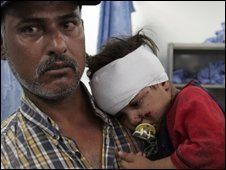Queensaj
Elite
Suicide bombers have killed at least 53 people and wounded about 240 in attacks on crowds in the Iraqi capital Baghdad and the northern city of Kirkuk.
Three blasts in Baghdad killed at least 28 Shia Muslim pilgrims heading for the city's Kadhimiya shrine.
The attacks, which wounded about 90 people, were carried out by women suicide bombers, police said.

In Kirkuk, a suicide bomber targeted a crowd of Kurdish protesters, killing at least 25 and injuring at least 150.
Kirkuk is disputed between Kurds, Arabs and Turkomans.
Demonstrators were protesting at a proposed law on local elections which has raised tensions there.
The city has been under heavy security because of the annual Shia pilgrimage.
Women and children were among those killed, security and hospital officials told AFP news agency
The BBC's Jim Muir in Baghdad says that major gatherings for Shia religious ceremonies have frequently been the target for bomb attacks, blamed on Sunni extremists.
Such attacks were a feature of the cycle of sectarian violence that gripped Iraq last year.
The attacks have been greatly reduced by US and Iraqi government forces taking action against Sunni-based insurgents on the one hand, and the Shia militias on the other.
But our correspondent says that stopping suicide bombers who move among crowds on foot, especially women wearing voluminous clothing, is particularly difficult.
The pilgrimage will reach a climax on Tuesday and more than a million worshippers are expected.
The Iraqi military spokesman in Baghdad, Brig Gen Qassim al-Moussawi, told AP news agency that 100,000 Iraqi security forces were being deployed - along with US reinforcements and air support - to protect the ceremonies in Kadhimiya.
Security forces are using about 200 women volunteers to search female pilgrims, AP said.
Despite the extra security, gunmen also shot dead seven pilgrims in the southern outskirts of Baghdad on Sunday.
The attacks come after an overall drop in the level of violence in Iraq in recent months.
Analysts says that radical Sunni groups - including al-Qaeda - have an added incentive to try to show it is not a spent force after being weakened in the Sunni heartland north and west of Baghdad.
However, violence in Kirkuk has a different dynamic, with an ongoing power struggle between the city's three main ethnic groups.
Despite the bombings in Baghdad, some Shia pilgrims said they were determined to continue with the ceremonies.
"Today we are going to visit the holy Shrine of Imam Kadhim. We pay no heed to bombings and death. We are believing in God," said Jassim Jihad.
In 2005 more than 900 people died in a stampede on the route to the shrine. The panic had been started by rumours of a suicide bomber in the crowd.
Three blasts in Baghdad killed at least 28 Shia Muslim pilgrims heading for the city's Kadhimiya shrine.
The attacks, which wounded about 90 people, were carried out by women suicide bombers, police said.

In Kirkuk, a suicide bomber targeted a crowd of Kurdish protesters, killing at least 25 and injuring at least 150.
Kirkuk is disputed between Kurds, Arabs and Turkomans.
Demonstrators were protesting at a proposed law on local elections which has raised tensions there.
The city has been under heavy security because of the annual Shia pilgrimage.
Women and children were among those killed, security and hospital officials told AFP news agency
The BBC's Jim Muir in Baghdad says that major gatherings for Shia religious ceremonies have frequently been the target for bomb attacks, blamed on Sunni extremists.
Such attacks were a feature of the cycle of sectarian violence that gripped Iraq last year.
The attacks have been greatly reduced by US and Iraqi government forces taking action against Sunni-based insurgents on the one hand, and the Shia militias on the other.
But our correspondent says that stopping suicide bombers who move among crowds on foot, especially women wearing voluminous clothing, is particularly difficult.
The pilgrimage will reach a climax on Tuesday and more than a million worshippers are expected.
The Iraqi military spokesman in Baghdad, Brig Gen Qassim al-Moussawi, told AP news agency that 100,000 Iraqi security forces were being deployed - along with US reinforcements and air support - to protect the ceremonies in Kadhimiya.
Security forces are using about 200 women volunteers to search female pilgrims, AP said.
Despite the extra security, gunmen also shot dead seven pilgrims in the southern outskirts of Baghdad on Sunday.
The attacks come after an overall drop in the level of violence in Iraq in recent months.
Analysts says that radical Sunni groups - including al-Qaeda - have an added incentive to try to show it is not a spent force after being weakened in the Sunni heartland north and west of Baghdad.
However, violence in Kirkuk has a different dynamic, with an ongoing power struggle between the city's three main ethnic groups.
Despite the bombings in Baghdad, some Shia pilgrims said they were determined to continue with the ceremonies.
"Today we are going to visit the holy Shrine of Imam Kadhim. We pay no heed to bombings and death. We are believing in God," said Jassim Jihad.
In 2005 more than 900 people died in a stampede on the route to the shrine. The panic had been started by rumours of a suicide bomber in the crowd.

 ..............
..............